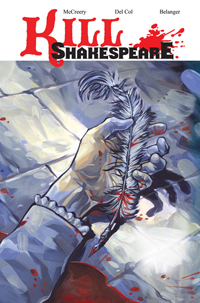For almost 80 years, Kirkus Reviews has served as the industry bible for bookstore buyers, librarians, and ordinary readers alike. Now Popdose joins the Kirkus Book Bloggers Network to explore the best — and sometimes the worst — in pop-culture and celebrity books.
This week, high and low cultures clash as the Bard of Avon gets the metafiction treatment…

Whether with highfalutin literary pastiche or lowly fan fiction, writers love to play with other people’s toys — paying tribute to the stories that nurtured them, arguing with their cultural predecessors, extending and embroidering shared worlds of fiction. But it is a perilous exercise. To invoke another writer is to invite comparison, and so to invite disgrace. Easy though it may be to imitate stylistic surfaces, it’s a killer getting to what makes a writer truly great. Many authors, for example, have attempted to conjure Raymond Chandler’s hard-boiled style by piling on the baroque similes — e.g., the cigarette that ”tasted like a plumber’s handkerchief” — and only ended up embarrassing themselves; they’re missing Chandler’s elegance, his pacing, the cool stalking rhythm of his phrasing. Similarly, persons assaying the witty style of Oscar Wilde are doomed to disappoint, unless their wit is, in fact, equal to that of Wilde himself. (No one’s is.)
Now take those concerns and multiply them by a factor of William Bleedin’ Shakespeare. The Bard comes down to us as the greatest writer in the English vernacular; indeed, he practically invented the English vernacular — along with the conflict between introspection and action that defines the modern condition. His creations are still alive for us, centuries on, and theater companies and filmmakers are still finding new ways to stage his plays. But the roadside of literature is littered with attempts to build upon or extend his works. Tom Stoppard just about managed it — managed it twice, in fact, first with Rosencrantz and Guildenstern Are Dead, then with Shakespeare In Love — but that’s because Tom Stoppard is a goddam genius. As for the others — well, does Lee Blessing’s 1991 Hamlet sequel Fortinbras get a lot of play on your local repertory stage?
Into these treacherous waters plunge Anthony Del Col and Conor McCreery, writers of the comics series Kill Shakespeare, now collected into a pair of snazzy trade paperbacks. Kill Shakespeare begins with Hamlet, prince of Denmark, sailing off to his exile. After his ship is attacked by pirates, he washes up on the shores of England — an England neither of history nor of legend, but a catch-all Shakespeare Country. The tyrant Richard III rules with the assistance of the powerful sorceress Lady Macbeth. They befriend the unsuspecting Hamlet, and dispatch him on a quest to kill a mysterious wizard and retrieve the wizard’s magical quill. The wizard’s name? William Shakespeare!
Oh, but it gets better…
Read the rest of this article at Kirkus Reviews!





Comments